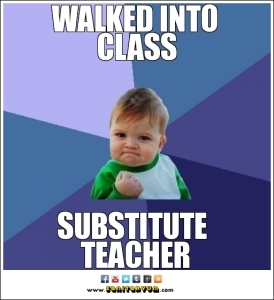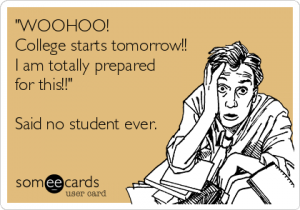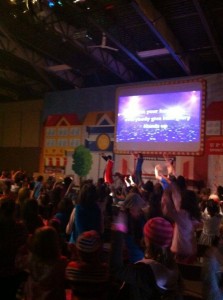This weekend I received an e-mail about taking a three credit, urban seminar course, taking place in Philadelphia in the “Maymester.” According to the e-mail, I will be collaborating and working with teachers and students, most likely in math classes ranging from grades 7-12. If I choose to participate, I will also perform community service around the area, attend seminars with urban professor experts, and ultimately, the course will provide me with 40 hours of experience in my field so I have an idea of how equipped I am to be a teacher and how well the career suits me when I am actually in the classroom.
The opportunity to take part in an experience like this is quite exciting, but with that excitement comes a lot of anxieties about whether or not I am even going to like being in the classroom and whether or not I will be successful in the classroom. I know several friends and family members who spent four years earning a degree in education, only to realize that the classroom was not an ideal atmosphere for them. My passion for education tells me that I will probably not experience the same shock, but obviously the fears are there.
In an attempt to gain perspective from people who completed the process and became Secondary Education teachers in Mathematics, I decided to interview my cousin, Marisa Mandel, and a family friend, Kelly Krahe. Marisa graduated from Penn State University, while Kelly graduated from Duquesne University. Both of them were top students in their class, and have proved to be incredibly successful as Secondary Education teachers for Mathematics.
I asked each of them a series of seven questions:
When and why did you decide to become a math teacher?
Marisa: I have always loved mathematics and truly worked hard to grasp fundamental concepts and theories. After learning from an amazing teacher my 11th grade year, I knew I wanted to have an impact on students the way she did on me. So much of learning mathematics is having confidence in yourself and that was something I wanted to instill in my students.
Kelly: Math was always my favorite subject all throughout school, so I always wanted to be a teacher from the time I was in elementary school. I remember playing “school” when I was younger and I was always teaching a math lesson. I also enjoyed helping my friends with their math work as I got older, and helping them have the “light bulb” moment, so this confirmed that math education was going to be a good fit for me.
What classes were most challenging as you worked toward earning your degree, and what classes do you think prepared you the most to take on your first classroom?
Marisa: Many of my classes were challenging, if not all of them. My math education classes were most valuable because they allowed us to learn how to actually teach and use mathematics in the classroom.
Kelly: I remember Discrete Mathematics and Calculus-based Statistics as two of the more challenging courses that I took during my undergraduate work. I often went to review sessions held by my professors, and I also had a study group with my peers that met each week for those courses. We all worked together to help each other study in the more challenging, higher-level math courses.
My education courses, particularly the “Teaching Secondary Mathematics” course, were certainly helpful in learning about the field of education and the process of planning and teaching a lesson. But, I would say that the most helpful thing that most prepared me for my first classroom was actually going out into the field and working in schools. Student teaching is where you can truly develop your own teaching style and prepare for having your own classroom, with the guidance of the classroom teacher. I still use some of the techniques and ideas that I learned from my student teaching mentor teacher in my classroom today!
Was there ever a point in time when you thought that teaching might not be the career for you? What happened and what was the outcome?
Marisa: There was not. I have always believed that teaching math is a gift I was given and having the opportunity to work with adolescents made it all the more rewarding and honorable.
Kelly: There were two times that I remember questioning if education was the right career for me. The first was at the end of my senior year of high school when I actually had to declare my major as Secondary Math Education. I was intimidated at that point in my life to make a decision that would determine my career for the rest of my life. As soon as I got started in my education program, I knew that I had made the right choice, and that my hesitation was simply nerves before starting college.
The second time that I questioned my career choice was the first 30 seconds of the school day on my very first day of my first teaching job. I remember standing outside of my classroom watching the students file into my homeroom and thinking that this was my classroom and it was completely up to me to teach the students. As soon as I greeted the students and began the day, my nerves immediately went away and I knew that I had made the right decision!
I think that it is completely normal to sometimes question a career choice, especially early on in undergraduate studies. It is sometimes difficult to know if a career, such as teaching, is right for you if you haven’t ever taught before! Now that I am a teacher, I couldn’t imagine doing anything else with my career. Talking with current teachers or academic advisors can help if you are questioning your career choice.
What math class do you enjoy teaching the most? (grade level and content)
Marisa: Teaching grades 9-12, I can honestly say that I enjoyed each and every class and the challenges that came with it. From honors and advanced to remedial and state proficiency tutorials, I learned and grew as a professional in all areas of teaching.
Kelly: I most enjoy teaching 8th Grade Algebra I, which is what I currently teach, and have been teaching for the past 4 years. I’ve taught a few other courses and grade levels, but Algebra I is my niche.
What are some of the biggest problems you faced in the classroom, in terms of instruction or management?
Marisa: I often wished I had more time with my students. Time to really focus and thoroughly expand on the important concepts being presented to them and how they would one day use them in life.
Kelly: One of the biggest challenges in the classroom is time. I would venture to say that most, if not all, teachers would agree that there is never enough time in the day to accomplish what we’d ideally like to accomplish. I find myself being very careful and detailed in my lesson planning to use every minute of class time to its fullest. I make sure to be fully prepared for each day so that I do not waste any of the time that I have with the students. There are many standards to be met within the context of a school year, so thoughtful planning is a must.
What is one of your favorite memories as a math teacher?
Marisa: I have so many, but mainly having my students tell me that they loved learning math and always looked forward to coming to my classroom because they knew they were going to learn something new, that meant the most to me.
Kelly: Teaching is unique in the fact that you could teach the same lesson five times in a row, and it will never be exactly the same each time. Students ask different questions, react in different ways to new concepts, and each class genuinely has a different personality of its own. As a result, I have so many memories, but one stands out to me fondly. During a previous school year, I had a student fail the very first test of the year. I pulled this quiet student aside and asked if she had expected this grade or if it was a surprise to her. She said to me that she expected it because she always does poorly in math because she’s just not good at it. I talked with her about this and said that I was willing to work with her this year on changing this if she was willing to start this year with an open mind about math. We worked together during tutorials throughout the year, and she ended up being a consistent A-B student and admittedly enjoyed my course by the end of the year. I was extremely proud of the progress that this student made during one school year and the confidence that she had gained along the way. These are the types of stories that make teaching so rewarding.
What type of teaching environments have you worked in? (suburban, rural, urban) If you have worked in multiple, which environment do you prefer?
Marisa: Suburban and rural – loved them both. Loved the students and remained focused on their needs regardless of their SES.
Kelly: I attended Duquesne University in Pittsburgh, PA, and part of the education program was to complete a certain number of field work hours each semester beginning second semester of freshman year. During those experiences, I worked mainly in urban settings in Pittsburgh Public School District near Duquesne’s campus. My student teaching, first year of teaching, and current contracted position have all been in suburban school districts. I personally prefer the suburban environment, most likely because I was born and raised in the suburbs. However, I have a friend from college, for example, that was born and raised in an urban school district, and he much prefers the urban setting. I think it is important to explore all types of school districts to find the type that fits with your own personality and teaching style. There is a fit for everyone!
Upon comparing the two separate interviews, there were striking similarities with what Kelly and Marisa said, and with what I have said in previous blog posts. Our career choice has been dictated by a genuine love for math and helping others. (Kelly and I both played make believe teacher in our basements as well!)
When discussing their college classes, both seem to emphasize that the education classes are the most important classes in shaping the skills necessary for the classroom. I will not personally take these types of classes for a year or so, but my Educational Psychology course is an introductory course that I love, and I cannot wait to experience future lectures in education classes.
Marisa, Kelly and I can all agree that college level mathematics courses are not easy, but it is possible to succeed, especially with help from peers and the professors. While working with peers, I can also gain some more experience in explaining math and ultimately, I am gaining experience for my career.
I have never formally questioned my decision to be a teacher, but I have certainly had anxieties about my abilities in the classroom. Also, since I have interests in other content areas besides mathematics, I have worried that I am missing out. However, since I have been at Penn State, I have received such a well-rounded experience, even in my freshman year, that I do not feel like I am missing out because my classes require so much content knowledge beyond mathematics. For instance, in English, I have the opportunity to write a paradigm shift paper and incorporate elements of science research!
Marisa found her passion to be in grades 9 to 12, and Kelly found hers in a grade 8 Algebra class. Currently, my goal is to teach a senior level Calculus course, but my mind will most likely change in the next couple of years. Moreover, I found it very interesting that both Marisa and Kelly agreed that their biggest challenge is time management. In my Educational Psychology class, we have been discussing various types of management, and my professor has continued to discuss time over and over. Now that I see its relevance in the real world, I can see why my professor has taken several lectures to discuss time management.
When asked about their favorite experiences, both Kelly and Marisa commented on the rewarding experience of helping a student to achieve that “light bulb” moment. Even in small tutoring sessions that I have had with my friends, I have experienced similar rewards, and I look forward to having an entire classroom and working to help each student succeed to the best of his/her ability.
Finally, I chose to ask them about the different environments that have taught in, just because I have some worries about working in an urban setting this summer. Coming from Hampton High School, a small suburban school lacking in diversity, I do not feel confident entering an urban setting. However, Kelly and Marisa both came from similar backgrounds as me, and they have been successful in rural, suburban and urban settings. This gives me reason to believe that with practice, training and mentoring, I will be equipped to tackle Philadelphia schools this summer.
It has been such a pleasure this week to interview these outstanding women. They have offered me so much valuable insight into the world of education, and I cannot wait to continue on the road to my own classroom.









